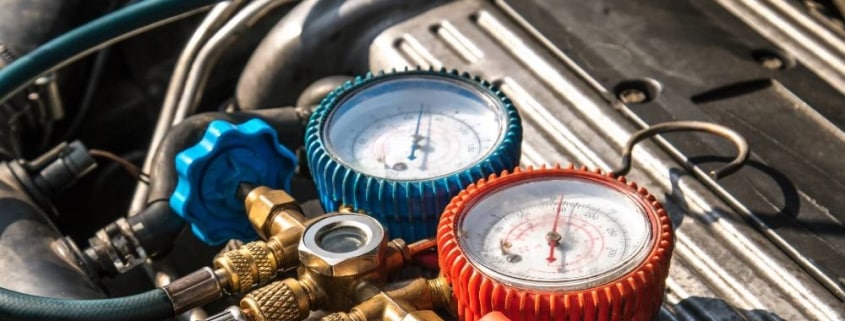A guide to air condensers
Car air conditioner not working? You may need a new AC condenser
If you turn on the AC in your car only to find it’s blowing room temperature, or in some cases even hot, air around your vehicle, then there’s a problem with the AC condenser unit.
But what is an AC condenser unit? In the article below, we’ll explain how AC condensers work, and what you’ll need to do to get yours fixed.
At Natrad, we offer nationwide warranties on all car air conditioning condensers fitted to your car. Get in touch with our team to find out what’s wrong with your AC condenser, and get your car functioning like normal.
How does an air conditioning condenser work?
Air conditioners in vehicles use refrigerants which change from a gas to a liquid and back again, generating heat and absorbing heat as it cycles. Air circulating in the car cabin passes through the evaporator, which is very cold due to heat being absorbed when the refrigerant changes from liquid to low pressure gas. This gas travels to the compressor where the refrigerant becomes high pressure hot gas. Outside the cabin, the hot refrigerant gas passes through the condenser to release heat to the atmosphere and turn the refrigerant into liquid before returning back to the evaporator to begin the cycle again.
When you turn on your vehicle’s air conditioner, a number of things happen:
- The compressor is engaged which converts refrigerant gas into a high pressure hot gas
- The air condenser converts the refrigerant hot gas to liquid as it releases heat to the atmosphere
- The heat is removed from the condenser by the condenser fan — aided by the vehicle moving
- Liquid refrigerant enters the evaporator where loses heat and changes back to gas
Why is my air conditioner not working?
Condensers are located at the front of vehicles. This means they are susceptible to damage from flying debris like small rocks and other matter flung up from the road. They are easily blocked by external debris like insects, leaves, or even dirt. They can also become blocked internally if the condenser fails.
When the condenser fails internally, metal particles and other debris can contaminate your car’s entire air conditioning system through the circulating refrigerant.
Condensers can also fail if:
- There is weld failure
- The tubes have holes in them
- The vehicle is involved in a front-end collision
How can I repair an air conditioning condenser
We have a range of over 500 part numbers for AC condensers, so if the unit has been damaged externally, we can fix it easily. However, if your vehicle’s air condenser has been clogged or damaged internally, we’ll need to replace the entire unit.
We do not recommend trying to repair your unit yourself. Condensers are a crucial element in your car’s AC, and you may damage the system further — ending up with costly repairs. The best option? Choose an expert vehicle AC specialist with the credentials to back up their work, like Natrad.
How to maintain your air condenser unit
Like other parts in your car, your condenser unit needs routine maintenance. By scheduling regular check-ups with a qualified technician, you can minimise the risk of having to replace the entire unit.
How to clean your air condenser unit
Over time, the condenser can become blocked with dirt and debris. If left unchecked, this can damage parts within the unit. If you notice the air isn’t as cold as it once was when you turn on your AC, it’s a sign you need to book a service with a technician. They’ll clean out your condenser unit, and your vehicle’s air conditioner will return to circulating cold air.
While they’re cleaning your condenser, an expert automotive specialist can also check the system for leaks, or internal damage. They’ll be able to catch potential problems early, preventing costly repairs or replacements.
How to make your air condenser unit quieter
Does your car make weird noises when you turn on your AC? If so, it’s a sure-fire sign something is wrong with your AC and condenser unit. Sometimes, it can be a simple fix, and other times you may need a technician’s assistance.
Can you hear any of the following?
- Loud squealing noise: This usually means there is a problem with the serpentine belt. Get this checked by an expert straight away. If the belt is damaged, it can lead to potentially dangerous failure within your car’s system.
- Buzzing noise: This noise indicates an overcharged system — which usually occurs when there is too much refrigerant. If left alone, it can cause your condenser to fail, so correct the issue straight away to avoid costly replacements.
- Knocking or clicking sounds: Something may be caught in your condenser unit, either debris from the road or loose nuts and bolts from inside your system. Leave your engine running, and pop the bonnet. You may be able to see what the problem is straight away. If not, schedule a check-up for your vehicle.
There’s one noise your AC may make which isn’t bad. If you hear a hissing sound when you turn off the engine, it’s just the refrigerant changing states.
Price guide to air condensers
Depending on the state of your air condenser, and the make and model of your car, prices can vary.
- Routine maintenance: Around $100
- AC regas: Between $115 and $165
- Condenser unit replacement: Between $500 and $1200
Why choose Natrad
At Natrad, we have the largest network of vehicle-cooling workshops in Australia. No matter where you are, if you’re having trouble with your car’s air condenser unit, our expert specialists can help.
We offer nationwide warranties on all air condenser repairs, part replacements, and units — and we have over 500 original equipment manufacturer parts to choose from.
If you’re having trouble with your car’s air conditioning condenser, nip into Natrad — we’ll give you comprehensive advice about your AC and parts, and conduct a thorough inspection of your vehicle.








